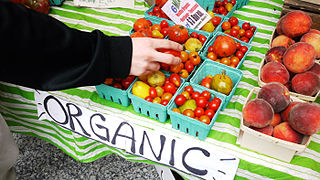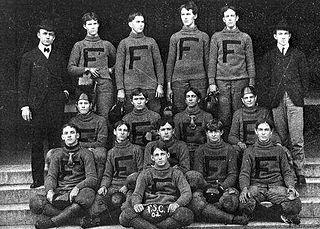
The United States secretary of agriculture is the head of the United States Department of Agriculture. The position carries similar responsibilities to those of agriculture ministers in other governments.

The United States Department of Agriculture (USDA) is the federal executive department responsible for developing and executing federal laws related to farming, forestry, rural economic development, and food. It aims to meet the needs of commercial farming and livestock food production, promotes agricultural trade and production, works to assure food safety, protects natural resources, fosters rural communities and works to end hunger in the United States and internationally. It is headed by the Secretary of Agriculture, who reports directly to the President of the United States and is a member of the president's Cabinet. The current secretary is Tom Vilsack, who has served since February 24, 2021.

The Agricultural Research Service (ARS) is the principal in-house research agency of the United States Department of Agriculture (USDA). ARS is one of four agencies in USDA's Research, Education and Economics mission area. ARS is charged with extending the nation's scientific knowledge and solving agricultural problems through its four national program areas: nutrition, food safety and quality; animal production and protection; natural resources and sustainable agricultural systems; and crop production and protection. ARS research focuses on solving problems affecting Americans every day. The ARS Headquarters is located in the Jamie L. Whitten Building on Independence Avenue in Washington, D.C., and the headquarters staff is located at the George Washington Carver Center (GWCC) in Beltsville, Maryland. For 2018, its budget was $1.2 billion.

4-H is a U.S.-based network of youth organizations whose mission is "engaging youth to reach their fullest potential while advancing the field of youth development". Its name is a reference to the occurrence of the initial letter H four times in the organization's original motto "head, heart, hands, and health", which was later incorporated into the fuller pledge officially adopted in 1927. In the United States, the organization is administered by the National Institute of Food and Agriculture of the United States Department of Agriculture (USDA). 4-H Canada is an independent non-profit organization overseeing the operation of branches throughout Canada. There are 4-H organizations in over 50 countries; the organization and administration varies from country to country.

The organic movement broadly refers to the organizations and individuals involved worldwide in the promotion of organic food and other organic products. It started during the first half of the 20th century, when modern large-scale agricultural practices began to appear.

Organic certification is a certification process for producers of organic food and other organic agricultural products, in the European Union more commonly known as ecological or biological products. In general, any business directly involved in food production can be certified, including seed suppliers, farmers, food processors, retailers and restaurants. A lesser known counterpart is certification for organic textiles that includes certification of textile products made from organically grown fibres.
Ground beef, minced beef or beef mince is beef that has been finely chopped with a knife, meat grinder, mincer or mincing machine. It is used in many recipes including hamburgers, bolognese sauce, meatloaf, meatballs and kofta.
Natural Resources Conservation Service (NRCS), formerly known as the Soil Conservation Service (SCS), is an agency of the United States Department of Agriculture (USDA) that provides technical assistance to farmers and other private landowners and managers.

The Economic Research Service (ERS) is a component of the United States Department of Agriculture (USDA) and a principal agency of the Federal Statistical System of the United States. It provides information and research on agriculture and economics.
The United States National Agricultural Library (NAL) is one of the world's largest agricultural research libraries, and serves as a national library of the United States and as the library of the United States Department of Agriculture. Located in Beltsville, Maryland, it is one of five national libraries of the United States. It is also the coordinator for the Agriculture Network Information Center (AgNIC), a national network of state land-grant institutions and coordinator for the U.S. Department of Agriculture (USDA) field libraries.

The Tuskegee National Forest is a U.S. National Forest located in Macon County, Alabama, just north of Tuskegee and west of Auburn. The topography is level to moderately sloping, with broad ridges with stream terraces and broad floodplains.

The National Agricultural Statistics Service (NASS) is the statistical branch of the U.S. Department of Agriculture and a principal agency of the U.S. Federal Statistical System. NASS has 12 regional offices throughout the United States and Puerto Rico and a headquarters unit in Washington, D.C. NASS conducts hundreds of surveys and issues nearly 500 national reports each year on issues including agricultural production, economics, demographics and the environment. NASS also conducts the United States Census of Agriculture every five years.
The Agricultural Marketing Service (AMS) is an agency of the United States Department of Agriculture; it maintains programs in five commodity areas: cotton and tobacco; dairy; fruit and vegetable; livestock and seed; and poultry. These programs provide testing, standardization, grading and market news services for those commodities, and oversee marketing agreements and orders, administer research and promotion programs, and purchase commodities for federal food programs. The AMS enforces certain federal laws such as the Perishable Agricultural Commodities Act and the Federal Seed Act. The AMS budget is $1.2 billion. It is headquartered in the Jamie L. Whitten Building in Washington, D.C.
The Child Nutrition Act of 1966 (CNA) is a United States federal law (act) signed on October 11, 1966 by President Lyndon B. Johnson. The Act was created as a result of the "years of cumulative successful experience under the National School Lunch Program (NSLP) to help meet the nutritional needs of children." The National School Lunch Program feeds 30.5 million children per day. NSLP was operated in over 101,000 public and nonprofit private schools in 2007. The Special Milk Program, functioning since 1954, was extended to June 30, 1970 and incorporated into the act. The act also provided Federal funding assistance towards non-food purchases for school equipment.

The Foreign Affairs Council (FAC) is a configuration of the Council of the European Union that convenes once a month. Meetings bring together the foreign ministers of the member states. Ministers responsible for European affairs, defence, development or trade also participate depending on the items on agenda. The configuration is unique in that is chaired by the High Representative of the Union for Foreign Affairs and Security Policy (HR/VP) rather than the member state holding the presidency of the Council of the European Union. There is one exception, when the FAC meets in the configuration of ministers responsible for trade (FAC/Trade), with the presiding member state's minister chairing the meeting.
The agricultural policy of the United States is composed primarily of the periodically renewed federal U.S. farm bills. The Farm Bills have a rich history which initially sought to provide income and price support to US farmers and prevent them from adverse global as well as local supply and demand shocks. This implied an elaborate subsidy program which supports domestic production by either direct payments or through price support measures. The former incentivizes farmers to grow certain crops which are eligible for such payments through environmentally conscientious practices of farming. The latter protects farmers from vagaries of price fluctuations by ensuring a minimum price and fulfilling their shortfalls in revenue upon a fall in price. Lately, there are other measures through which the government encourages crop insurance and pays part of the premium for such insurance against various unanticipated outcomes in agriculture.

William Howard Northey is an American politician who served as the Under Secretary for Farm Production and Conservation in the United States Department of Agriculture from 2018 to 2021. A member of the Republican Party, he previously served as the Secretary of Agriculture of Iowa, first elected on November 7, 2006 and sworn in on January 2, 2007. In that position he led he led the Iowa Department of Agriculture and Land Stewardship.

The Census of Agriculture is a census conducted every five years by the U.S. Department of Agriculture’s National Agricultural Statistics Service (NASS) that provides the only source of uniform, comprehensive agricultural data for every county in the United States.

The Cooperative State Research, Education, and Extension Service (CSREES) was an extension agency within the U.S. Department of Agriculture (USDA), part of the executive branch of the federal government. The 1994 Department Reorganization Act, passed by Congress, created CSREES by combining the former Cooperative State Research Service and the Extension Service into a single agency.

The 1902 Florida State College football team represented Florida State College in the sport of American football during the 1902 college football season. The team was the first intercollegiate football squad to represent Florida State University and was led by head coach W. W. Hughes. The team posted a 2–1 record and won the State Championship. With no formal nickname or mascot, the Florida State College football team was known simply as e. g. the "Florida State College Eleven".












